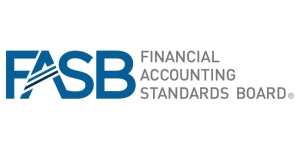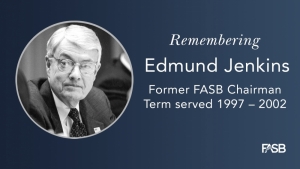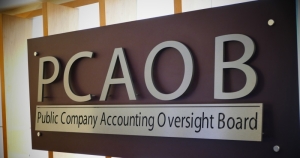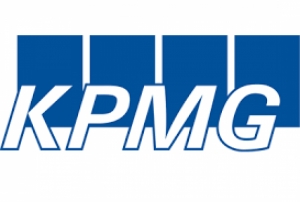عرض العناصر حسب علامة : sec
الإثنين, 16 أكتوبر 2023 12:02
يعدل مجلس FASB التدوين ليتوافق مع افصاحات لجنة SEC
يعدل مجلس معايير المحاسبة المالية FASB التدوين ليتوافق مع افصاحات لجنة الأوراق المالية والبورصات SEC.
معلومات إضافية
-
المحتوى بالإنجليزية
FASB issued an Accounting Standards Update (ASU)
that incorporates 14 SEC disclosure requirements into the FASB Accounting Standards Codification, a set of amendments covering a variety of topics that will affect a variety of reporting entities subject to GAAP.
The ASU's introductory section summarizes which among the 27 disclosures, issued in
SEC Release No. 33-10532, Disclosure Update and Simplification, have been incorporated into FASB codification. The SEC update was issued Aug. 17, 2018.
According to a FASB news release, the ASU amendments aim to "clarify or improve disclosure and presentation requirements of a variety of codification topics, allow users to more easily compare entities subject to the SEC's existing disclosures with those entities that were not previously subject to the requirements, and align the requirements in the codification with the SEC's regulations."
Regarding effective dates for the amendments, FASB noted in the news release:
"For entities subject to the SEC's existing disclosure requirements and for entities required to file or furnish financial statements with or to the SEC in preparation for the sale of or for purposes of issuing securities that are not subject to contractual restrictions on transfer, the effective date for each amendment will be the date on which the SEC removes that related disclosure from its rules. For all other entities, the amendments will be effective two years later. However, if by June 30, 2027, the SEC has not removed the related disclosure from its regulations, the amendments will be removed from the codification and not become effective for any entity."
نشر في
محاسبة و مراجعة
الأربعاء, 15 سبتمبر 2021 20:55
كيف يمكن للزمالة الأكاديمية أن تعزز حياتك المهنية؟
معلومات إضافية
-
المحتوى بالإنجليزية
Nerissa Brown, Ph.D., had been interested in an academic fellowship with Office of the Chief Accountant at the SEC for years before she finally decided to submit her application in 2017.
At that time, she was a few years into a tenure-track position at the University of Delaware. She knew that the fellowship would mean commuting to Washington, D.C., being away from her 4-year-old daughter during the week, and spending nights and weekends on her ongoing research.
However, Brown decided there might never be an ideal time for a fellowship, so she might as well take the plunge. Rather than let logistical challenges stand in her way, she took a leap of faith, one that she says changed her life.
“I definitely see going to the SEC as changing the trajectory of my career,” said Brown, who completed her fellowship in 2018. The experience opened a new chapter for her: It helped motivate her to move into an associate professorship at the University of Illinois Urbana-Champaign, and a year later, a new role as academic director for its bachelor’s and master’s programs in accountancy.
Faculty might be interested in such fellowships but hesitant to pursue them, given that they often require suspending research, teaching, and other commitments. But Brown and other faculty who have taken fellowships say the time they spent immersed in the work of regulatory agencies such as the SEC and PCAOB paid off in their careers long after the programs were over.
“What you get out of it and what you can give back to the profession is way more than any time that you might lose working on your own portfolio of research,” Brown said. “That one year is like an investment in yourself.”
Below, they describe their experiences and what they gained from them.
Opening doors to new research
Andrew Kitto, Ph.D., an assistant professor of accounting at the University of Massachusetts Amherst, completed a PCAOB fellowship in 2019, after his first year teaching.
Kitto said he was drawn to the PCAOB because of the quality of data he would have access to.
“The fellowship has really allowed me to answer research questions that would have been much more difficult to investigate with only publicly available data,” Kitto said. “I think it's positively impacted the contribution of my research and has certainly helped my portfolio in a lot of meaningful ways.”
Zach Kowaleski, Ph.D., an assistant professor of accounting at the University of Notre Dame, was drawn to a PCAOB fellowship for similar reasons: It offered access to data on audit quality in the broker-dealer industry that isn’t publicly available, he said.
Brown said her time at the SEC also helped her advance her research by allowing easier access to the data and feedback from staff experts.
One of Brown’s projects was about using machine learning to detect what firms are discussing in their financial statements and using that information to predict fraud. While in her fellowship, Brown got to see how the technology works and talk with the staff that helped develop it, she said. One day at a meeting, she found herself sitting near a chief economist who helped build the algorithm.
“I had one of the most awesome conversations with him about that paper,” Brown said. “He actually had his old speeches that he wrote and showed me on his iPad and said, ‘You're doing the exact same thing that I was talking about in this speech.’”
Teaching with a new perspective
Kowaleski wasn’t sure what to expect when meeting the regulators of Washington, D.C. The fellowship gave him a better understanding of the institutions accountants operate within, which also makes him a better teacher, he said.
“As both a former auditor and PCAOB fellow, my experiences help me take both perspectives when speaking to students about how regulation shapes audits,” he said. “This helps students see beyond the textbook.”
Brown said that the time she spent immersed in day-to-day operations at the SEC, participating in task forces and consultations on complex topics, such as revenue and crypto-asset recognition, helped illuminate the real-life consequences of everything she teaches in the classroom.
On the first day of classes, she said, she now motivates her students by telling them that, with high-quality reporting and auditing, they can be the superheroes that will root out fraud and misbehavior in the capital markets, where so much is at stake.
Building networks and professional potential
All three professors say the connections they made through their fellowships have expanded their professional networks and their opportunities.
“The level of people you interact with is second to none,” Brown said. “You’re interacting with the chief accountant who monitors accounting across the U.S. and with individuals who are top partners in the Big Four, and you’re actually meeting the SEC chairman. That’s the level of interaction that you just don’t have as a regular faculty member.”
Brown has been invited back to the SEC to present her research, has hosted SEC experts to speak to accounting classes, and has even connected other professors at her university with experts at the SEC who can help with their questions.
Kitto said when he needs a sounding board or has a specific question related to his research, he can reach out to PCAOB staff members and they don’t hesitate to help.
“The network of former fellows has been a tremendous network to be able to tap into,” he said.
Advice for applying for a fellowship
Brown, Kitto, and Kowaleski offered a few suggestions for accounting colleagues who are considering applying for a fellowship:
Search for opportunities on websites for regulatory agencies and on job boards such as those hosted online by the Social Science Research Network (SSRN). If a fellowship does not exist for the area you’re interested in, consider writing to a relevant agency or firm and proposing one.
Don’t let obstacles such as distance dissuade you from applying, Brown said. Most agencies offer flexible work arrangements, as many employees commute from other states or work remotely some of the time. Options for remote work may be even better this year due to the pandemic, she said.
When applying, reach out to past fellows to ask about their experiences and what to expect, Kitto said.
Learn about the data that is collected by the agency you are applying to and read prior research that uses its data, Kowaleski said. Consider ideas that further the literature, but also overlap with the needs of regulators.
If you missed the deadline to apply for the next round, don’t let that discourage you, Kitto said. He missed an application deadline and it ended up being a “blessing in disguise,” as it gave him extra time to prepare his application for the following year. It allowed him to submit more well-researched and workable research proposals, which strengthened his application.
— Samiha Khanna is a freelance writ
نشر في
موضوعات متنوعة
الإثنين, 14 ديسمبر 2020 13:35
وفاة إد جينكينز، رئيس FASB السابق، عن عمر 85 عامًا
نشر في
موضوعات متنوعة
موسومة تحت
الأحد, 13 ديسمبر 2020 11:47
خطط PCAOB لتغيير عمليات الفحص والتفتيش على شركات التدقيق في عام 2021
نشر في
محاسبة و مراجعة
الخميس, 21 مايو 2020 13:34
علوم المحاسبة المالية : فجوة التوقع و ظهور جرائم الغش
معلومات إضافية
- المحتوى بالإنجليزية Expectancy gap and the emergence of fraud crimes
نشر في
محاسبة و مراجعة
الأربعاء, 20 مايو 2020 14:04
مدخل إلى علوم المحاسبة المالية : ال SEC و تأثيرها على نشأة المعايير
معلومات إضافية
- المحتوى بالإنجليزية Introduction to Financial Accounting Sciences: The SEC and its impact on the emergence of standards
نشر في
محاسبة و مراجعة
موسومة تحت
الأحد, 03 نوفمبر 2019 13:10
غرامة ضخمة على كي بي أم جي: القشة التي كسرت ظهر الأربعة الكبار؟
نشر في
محاسبة و مراجعة
موسومة تحت







